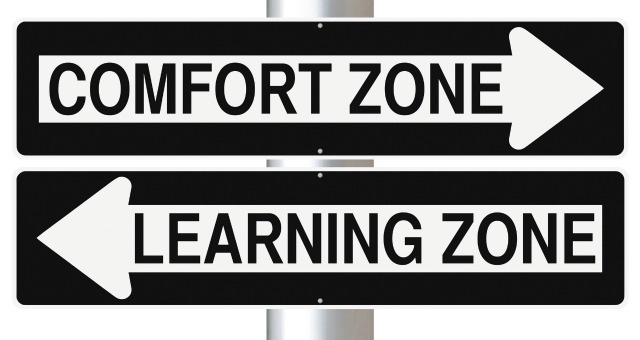Ever been told you should “step outside your comfort zone”? I’ve heard it said in contexts where managers have wanted teams and individuals to stretch, reach ambitious targets, achieve something out of the ordinary. But what does it actually mean?
Quite simply, your comfort zone is where the outcomes of your activities are pretty certain. There’s routine, stability. The same action has the same consequence, always. It’s a low stress environment, and one that once mastered, doesn’t require much adaptation from your side. Sound a little boring? That’s because it is.
Learning does not happen in your comfort zone. Our brains just aren’t wired that way. If you don’t believe me, believe the super smart scientists at Yale University that conducted a study with monkeys to see the differences in brain activity when the probability of a specific outcome of a task was fixed, and when it fluctuated. The monkey brains proved: we learn when there is uncertainty. The scientists were quick to point out that we don’t want to be in a state of learning all the time, but if we don’t push ourselves out of our comfort zone at least some of the time, we’re going to stagnate.
What does this mean for you? How do you get yourself out of your comfort zone?
- Do things differently
Change things up a little. Try a new system, a new method for solving a recurring problem. You don’t want to abandon all sense and rationality, so do your research, and read up on alternative solutions before attempting something new – but attempt it!
- Take on projects that require you to flex your (unused) muscles
If you have a skill that is underutilized, give yourself the opportunity to practice it. Ask for projects and take on work that requires you to colour with all the crayons in your box. By using a new set of skills, you’re also learning about what you’re capable of, which has great side-effects for self-esteem.
- Ask for feedback
Sometimes it’s difficult to self-reflect meaningfully because we can’t always see the patterns and behaviours that we practice every day; they become part of the cognitive furniture so to speak. But a manager, colleague, or a mentor if you have one, can offer you an outsider’s perspective. By gaining this self-knowledge, you’ll know where your areas of change are situated.
- Find ways of dealing with stress
One of the disincentives for leaving our comfort zone, is that it’s pretty stressful and anxiety-provoking to be out in the wilderness of the uncertain. So figure out coping mechanisms. Learn how to deal with anxiety and how to channel that energy in constructive ways. You’ll feel more prepared to get into a new groove, if you know you can cope with the changes that are imminent.
—-
If you’re lacking the confidence to get out into the world of the uncertain, reach out to us and we’ll talk you through some gentle techniques to get you more comfortable with discomfort: hello@merakicollective.co.za.


